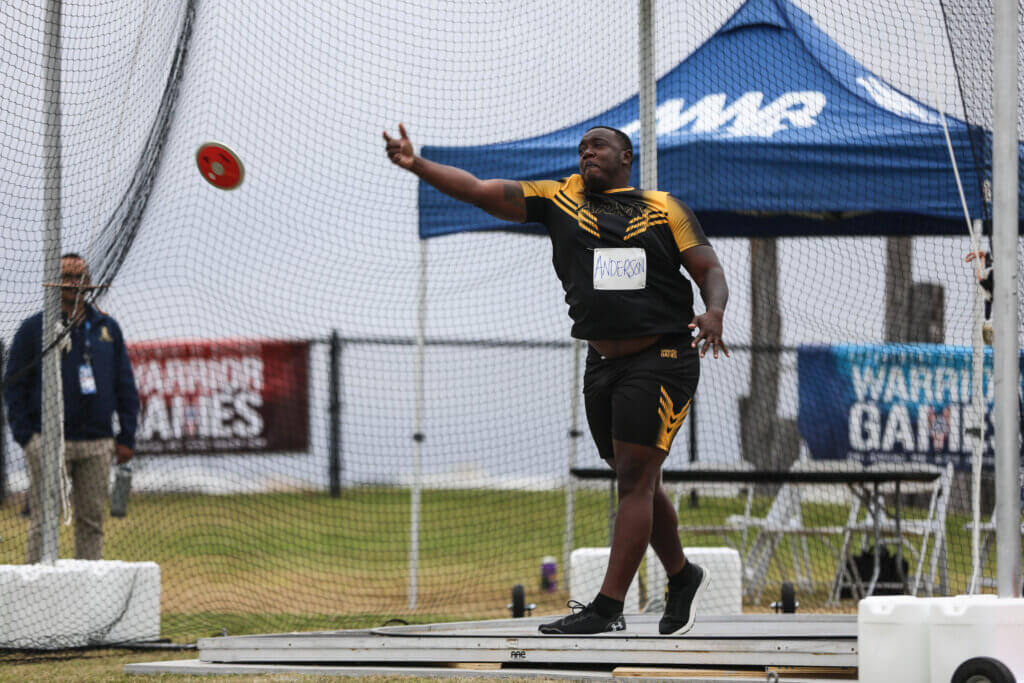Two reserve component athletes are among those who medaled at the 2023 Department of Defense Warrior Games Challenge. But for them, the competition was about more than wins and losses.
Army Reserve Sgt. Finlahy Cortez-Alvarez and Army National Guard Sgt. Bill Anderson spoke to Reserve + National Guard Magazine last week from Naval Air Station North Island, San Diego, California, while immersed in competition.
Cortez-Alvarez is a multi-sport competitor — they’re all multi-sport athletes — who partook in four sports at the games. She began with wheelchair rugby and then moved to cycling, hoping to use a regular bike.
“I cycled with a recumbent bike, and this is due to my back injury. I was trying to use the regular standing upright bike,” Cortez-Alvarez said. “It’s still painful. So, still on the way to recovery.”
She finished the latter part of the week in track and wheelchair basketball. Cortez-Alvarez was injured last September after leaving the range with a group of other soldiers who were practicing for classification as part of their unit’s mission readiness. The van they were traveling in was struck by another vehicle in an intersection, and Cortez-Alvarez suffered damage to her spine.
She was referred to the soldier recovery unit at Fort Moore, Georgia, where it was determined that surgery wouldn’t be required. However, Cortez-Alvarez will receive steroid shots in her spine beginning next month.
“Many soldiers, when they tend to be involved in or have a type of injury or get an illness, we are really clueless of exactly what’s going to happen in our transition,” she said.
But Cortez-Alvarez soon discovered the Army’s Recovery Care Program, formerly called the Army Wounded Warrior Program, and the reservist, who participated in Russian ballet while growing up, found a way to enhance her care.
“The adaptive recovery program, care program … we get involved into it, and then we see, ‘Oh wow, we can still keep doing things, trying to stay active, engage, and while we still are recovering,’” she said.
Anderson, who competed in a plethora of events — archery, field events, rowing, powerlifting, shooting and wheelchair basketball — at the Warrior Games, came to the adaptive athletic arena via neck and back injuries, or spinal lumbar degenerative disc disease, while on the Texas border mission in 2021.
“They found some spots on my kidney, which they found not cancerous, but it was mostly my back, my neck and my kidneys, which brought me to the [Soldier Recovery Unit] SRU,” Anderson said. “When I was with that kidney, it bothered me a lot because I thought it was more serious than what I found out eventually was.
“The lower back and neck, it bothered me because, as being a competitor, I felt like I would never be able to do anything on a higher level because of the pain that I get when I start running or when I bend over for too long or the weight that I carry.”
The former semi-professional football player from Orlando, Florida, said he mentally overcame the situation being around motivated people in the SRU in similar circumstances.
RELATED: Army ranger, 3-time medalist returns to DOD Warrior Games
“And seeing how they were to adapt to it and be able to train around that specific injury so that they could still get the workout in but not actually hurt themselves,” he said.
Anderson and Cortez-Alvarez both medaled at the Warrior Games Challenge, but the training, goal orientation and desire to improve that the games stimulated seem to have spiritually nourished the injured soldiers.
The Venezuelan-born and raised Cortez-Alvarez, who was more artist than athlete growing up, has become a full-fledged athlete (twice competing in the Army Ten Miler in Washington D.C.), and competition has carried her.
“Is always a purpose that we as the soldiers strive for,” she said. “But I think that also to see that you can motivate others and then we have so much in common, you know, regardless of type of injuries sustained … it drives everybody to get better at what we’re doing now.”
For Anderson, the games have impelled a higher quality of life.
“I didn’t know about the Warrior Games, and now it feels excellent,” he said. “It feels something that’s big, and you know, a lot of people should know more about. I actually do expect it to be a big part of my life. It’s not something that I could do forever … the rules of how many times you can compete. But it just gave me something to look towards.”

